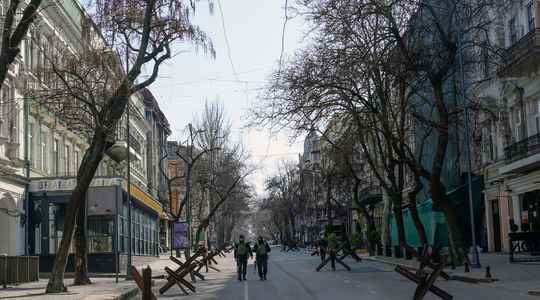For a month the message has been hammered home, repeated each time American officials speak. This Monday, President Joe Biden’s statement was no exception to the rule. The Russians “assure (…) that Ukraine has chemical and biological weapons in Ukraine. This is a clear sign that (Vladimir Putin) plans to use these two types of weapons”, he said. asserted, warning that such a move would elicit a “harsh” Western response.
The concern is palpable. Between the two camps, it is a war of narrative that is being played out. On the one hand, Russia accuses the United States of funding a program for the stealthy spread of deadly pathogens on Ukrainian soil, which the United States completely denies. On the other hand, the American position considers that these statements could be a “false flag”, a communication operation aimed at preparing the ground and public opinion for a real chemical attack led by Russia against Ukraine. . “Now that Russia has issued these false accusations and China seems to be adopting this propaganda, we must monitor any possible use by Russia of chemical or biological weapons in Ukraine,” warned the White House spokeswoman. Jen Psaki on Twitter.
This weekend, as fighting continued to rage in northeastern Ukraine, an alert about an “ammonia leak” at a fertilizer factory in the Sumy region raised the level even further. tension on the subject. An accident, caused by a bombardment of unspecified origin according to the Ukrainian emergency services, which forced the authorities to ask the inhabitants of the neighboring town to take shelter… and did not fail to make Russia react . Igor Konashenkov, the army spokesman, judged that the incident was a “provocation” by kyiv to accuse Moscow of “the use of chemical weapons”, and assured that the factory had been mined by the “Ukrainian nationalists”.
The Russian stalemate casts doubt
Simple rhetorical war or real threat? “I do not believe in the use of chemical weapons on the Ukrainian ground,” assures Olivier Lepick, associate researcher at the Foundation for Strategic Research and specialized in biological and chemical weapons. On the one hand, Russia is a signatory to an international treaty on the prohibition of such weapons, signed by nearly 200 countries in 1997 and which prohibits the research, production, stockpiling and use of chemical weapons. Worldwide, 96% of weapons declared by signatory countries have been destroyed under the supervision of the Organization for the Prohibition of Chemical Weapons (OAIC). Consequently, Olivier Lepick is cautious: “I do not believe that Russia has been able to reconstitute a stock of extensive chemical weapons”.
But the current context of the war in Ukraine casts doubt. On the ground, the Russian human losses are accumulating, the forces are not proving to be as effective as expected, and “nothing is going as planned”, detailed to L’Express the former head of the American army in Europe. , General Ben Hodges. As a result, “if the Russian invasion continues to lose momentum, Putin may become desperate enough to order the use of chemical weapons,” Australian Major General Mick Ryan, former Commandant of the Australia Defense College, said in a statement. tribune to the australian daily The Sydney Morning Herald.
Serious consequences
Especially since certain events suggest that Russia has not always respected its commitments in terms of chemical weapons. “Russia officially no longer has a military chemical arsenal, but there are a number of doubts that persist, especially since the attempted assassination of former Russian agent Sergei Skripal, then the poisoning of Alexei Navalny”, explains Olivier Lepick. These two assassination attempts with Novichok, a nerve agent attributed to Russia, “suggest that Russia does not respect the OPCW convention, and that it can still produce small quantities of chemical agent”, emphasizes the researcher.
Nothing indicates for the moment that Russia is preparing to use such a weapon insists Olivier Lepick, and the strategic interest of this type of weapon remains discussed by specialists. Non-discriminatory, a chemical attack would above all aim to “terrorize” the military and civilian populations who would resist in the cities. But the potential consequences for Russia could be high. Apart from the international outrage that this would represent, and the strengthening of sanctions against Russia, the chemical threat raises the possibility of increased military pressure from NATO on Vladimir Putin.”Creating a pretext for Using a chemical weapon is unacceptable. The price would be very high, but I don’t want to speculate on NATO’s military response,” promised the head of the Atlantic Alliance. In his text to the Australian newspaper Mick Ryan then envisages that such an act “would galvanize the support of the United States and NATO for the defense of Ukraine”. The use of chemical weapons would thus be likely to upset the current order of war in Ukraine.
